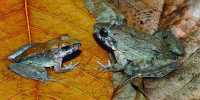According to a new study, pugs should no longer be classified as “normal dog” because of the breed’s numerous health problems. The researchers contend that the massively increased risks associated with “designer dog” breeding have pushed respiratory and brain issues in pugs to the point where the breed has now diverged from other mainstream dogs and that both pugs and other brachycephalic dogs face a variety of healthcare challenges. The findings were reported in the journal BMC Canine Medicine and Genetics.
Pugs, like bulldogs, boxers, and other “designer breeds” with pushed-in noses, are brachycephalic dogs, meaning their snouts are shorter and their heads are frequently smaller. This leads to clogged airways and other health issues. Famous celebrities posing with their pugs and a huge social media presence may be partly to blame for the rise in popularity of brachycephalic dogs in recent years. Pugs are still being bred to have even shorter noses, despite their evident flaws, and welfare groups have sprung up in an attempt to develop a healthier breeding standard.
A team from The Royal Veterinary College in the United Kingdom examined the risks of 40 prevalent illnesses in 4,300 pugs and over 22,000 non-pug breeds in the most recent study. Pugs had a 1.86-times greater likelihood of being diagnosed with one or more disorders than non-pugs. Pugs showed a greater prevalence of 23 of the 40 diseases studied. Obstructive airway syndrome (nearly 54-times greater risk), stenotic nares (pinched nostrils that make breathing difficult; 51-times higher risk), and ocular ulcers were among the most prevalent (13-times higher risk).
Pugs scored well on seven of the illnesses, including heart murmurs and aggressiveness, indicating that the breed has some redeeming health features. Nonetheless, the findings point to an immensely elevated incidence of various illnesses in pugs, the majority of which are directly associated to snout shortening. “The problem is that you have a dog with a smaller skull, but nothing else about the dog has become smaller,” Dr Myfanwy Hill, a veterinary surgeon at the University of Cambridge, told the BBC, adding that the findings are not surprising.
According to the experts, pugs “no longer qualify as a conventional dog” due to a variety of health issues. “The current analysis shows that predispositions outnumber safeguards for common diseases in Pugs and non-Pugs, implying some major health welfare problems for Pugs,” the scientists conclude. “Highly disparate health profiles between Pugs and other dogs in the United Kingdom imply that the Pug has drifted significantly from mainstream dog breeds and can no longer be regarded a normal dog in terms of health.”
















